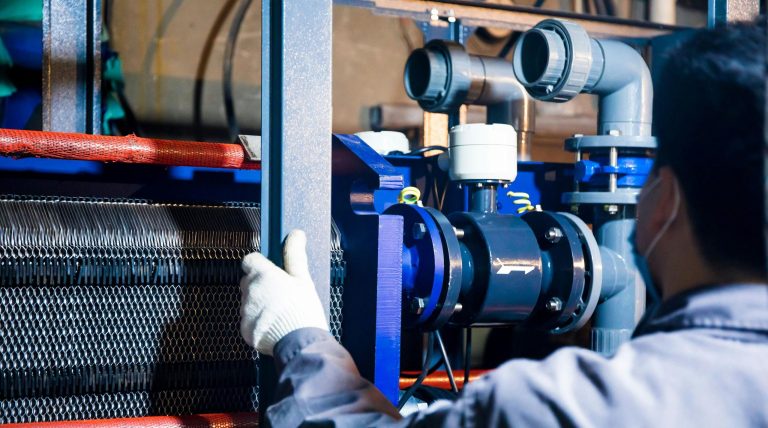Energy-efficient Strategies to Incorporate in Industrial Spaces
In today’s world, businesses in industrial spaces face the dual challenge of increasing operational efficiency and reducing energy consumption. The manufacturing industry, in particular, consumes a significant amount of energy, making it crucial to reduce usage. Therefore, it’s paramount for industrialists and professionals to know how to improve their organization’s energy efficiency and lessen environmental impact from the outset, i.e., at the time of construction.
Here are 9 practical strategies to boost energy efficiency that can be implemented when setting up a business in an industrial park. By adopting these solutions, companies can operate more efficiently and conserve resources for the future.
1. Maximize Use of Daylight
The first step is to reduce dependence on artificial lighting. Instead, professionals should take advantage of natural light while building business in their industrial plot. Design your factory layout to allow maximum sunlight penetration.
Installing skylights, large windows, and light tubes can significantly cut down your energy consumption during daylight hours. Additionally, utilizing daylight-responsive controls in industrial spaces can help adjust artificial lighting based on the availability of natural light.
2. Improve Building Insulation
Next, proper insulation is crucial. It maintains optimal indoor temperatures and reduces the need for heating and cooling. Concrete wall insulation, fibreglass insulation, and house wraps are some of the techniques that can be used in industrial spaces.
Ensure that your building’s walls, roofs, and floors are well-insulated. High-quality insulation materials can prevent heat loss during winter and keep the building cool in summer, leading to substantial energy savings.
3. Conduct Energy Efficiency Audits
One of the steps is to conduct thorough energy efficiency audits. Regularly assess your energy usage in your industrial spaces. This indeed, helps identify where and how energy is being wasted. These audits can highlight multiple areas –
- finding areas that need improvement
- checking if the equipment & machinery in use are outdated
- poor insulation
- inefficient lighting systems
Hence, by understanding your energy consumption patterns, you can implement targeted measures to reduce waste in the industrial land.

4. Upgrade to LED Lighting
Switching to LED lighting in factories is one of the simplest yet most effective ways in industrial park sites. LEDs use significantly less energy than traditional lighting options and have a longer lifespan. Implementing motion sensors and automated lighting controls can further enhance energy savings by ensuring lights are only used when necessary.
5. Use Energy-Efficient Equipment
Another strategy is to invest in energy-efficient machinery and equipment for your production processes in industrial spaces. Modern equipment often comes with advanced features that reduce energy consumption without compromising performance. Regular maintenance of your equipment ensures they operate at peak efficiency.
6. Transition to Renewable Energy Sources
Magna Star Industrial & Logistics Park appreciates businesses that are focused in green manufacturing. Also, industrialists must prioritize green practices in their establishment process at business plots.
Prioritize renewable energy sources like solar, wind, or geothermal can dramatically reduce your reliance on fossil fuels. Installing solar panels or wind turbines can generate a significant portion of your energy needs.
Moreover, the government is to launch a scheme of providing subsidies for commercial and industrial spaces by 2025. It’s ideal to be prepared for these benefits.
7. Embrace Waste Management
Reusing materials saves energy compared to making new products. For instance, recycled metals and wood can be reshaped for construction.
Repurposing materials, like shredding old tyres for erosion control, also cuts energy use in industrial spaces. Even everyday items, like cardboard boxes, can be reused for insulation or packing.
Furthermore, recycling is also important in construction in industrial spaces. By sorting waste and sending recyclables to specialized facilities, materials can be reused or processed, conserving resources and reducing landfill waste and pollution.

8. Educate Employees on Energy Conservation
Train your staff on the importance of energy conservation, and encourage energy-saving habits and eco-friendly practices. Simple actions like turning off machines when not in use, reporting energy waste, and following efficient work practices can collectively make a big difference in cost control too at industrial spaces.
Regular workshops and training sessions can keep energy conservation at the forefront of everyone’s mind.
9. Streamline Production Processes
Implementing efficient production processes in industrial park plots can lead to significant energy savings. Conduct a thorough analysis of your production line to identify bottlenecks and inefficiencies. Lean manufacturing techniques, process automation, and regular maintenance can optimize production, reduce energy consumption, and improve overall productivity.
Key Takeaways
Industrialists often struggle to go green right from the construction stage in industrial spaces. But, by taking significant measures, businesses can not only reduce their environmental footprint but also enjoy substantial cost savings, contributing to a more sustainable and profitable future. Also, they should contribute to a green environment by planting more trees and plants around their industries. It enriches the air quality and beautifies the surroundings too.
Businessmen should be concerned about the alarming pollution level in todays day. By keeping a clean, safe, and sustainable environment industrial spaces and their people can breathe afresh and minimize health issues.
Making industries more technology-based is another initiative. With more recordings and paperwork done online, businesses can stay up-to-date, save money, minimize wastage, and reduce carbon footprint.
Everything along, it is also essential to educate others about energy conservation, lead by example, and promote green habits within our communities.



